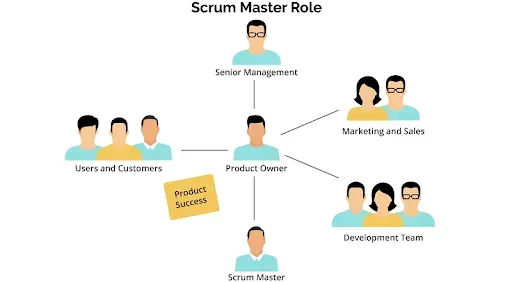
The Agile Revolution and the Need for Scrum Masters

The Agile Revolution:
The Agile movement was born out of a need to address the limitations of traditional project management methodologies in an increasingly complex and uncertain business environment. Unlike traditional waterfall approaches, Agile methodologies promote flexibility, adaptability, and continuous improvement through iterative cycles of work.
The Role of Scrum:
Scrum is a popular and widely used Agile framework that emphasizes collaboration, self-organization, and rapid delivery of value to stakeholders. At its core, Scrum relies on a set of roles, events, artifacts, and rules that guide teams in delivering high-quality products or services.
The Scarcity of Scrum Masters:
While the adoption of Agile methodologies continues to grow, the supply of skilled Scrum Masters has not kept pace with the demand. This scarcity is due to several factors, including the relative novelty of Scrum compared to traditional project management roles, the specialized skill set required, and the ongoing evolution of Agile practices.
The Skills and Responsibilities of a Scrum Master

Facilitation and Leadership:
One of the primary responsibilities of a Scrum Master is to facilitate effective collaboration and communication within the Scrum Team. They act as a servant-leader, ensuring that the team has the necessary support, resources, and environment to deliver value. Scrum Masters facilitate Scrum events, such as daily stand-ups, sprint planning, and retrospectives, fostering a culture of continuous improvement and accountability.
Coaching and Mentoring:
Scrum Masters play a crucial role in coaching and mentoring the Scrum Team on Agile principles and practices. They guide team members in adopting Agile mindsets, experimenting with new approaches, and overcoming obstacles. Effective Scrum Masters empower the team to self-organize and make decisions while providing guidance when needed.
Conflict Resolution:
Conflict is inevitable in any team setting, and Scrum Masters are skilled in conflict resolution techniques. They address conflicts within the Scrum Team and promote healthy communication and collaboration. By fostering a positive team dynamic, Scrum Masters enable individuals to work together effectively and focus on delivering value.
Removing Roadblocks:
Scrum Masters act as facilitators in removing obstacles that impede the progress of the Scrum Team. They identify and address issues related to resources, dependencies, and external factors, allowing the team to maintain a steady pace of delivery. By clearing the path for the Scrum Team, they enable a smooth and efficient workflow.
Continuous Improvement:
A key aspect of Agile methodologies is the emphasis on continuous improvement. Scrum Masters drive this process by encouraging the team to reflect on their processes and practices regularly. Through retrospectives and other feedback mechanisms, Scrum Masters help identify areas for improvement and facilitate action plans to address them. They also promote a culture of learning and experimentation within the team.
How to Position Yourself for Success as a Scrum Master

1. Gain Agile Knowledge and Certification:
To become a highly sought-after Scrum Master, it is crucial to gain a deep understanding of Agile principles and practices. Pursuing certifications such as the Certified ScrumMaster (CSM) or Professional Scrum Master (PSM) can validate your knowledge and demonstrate your commitment to the role.
2. Develop and Showcase Soft Skills:
While technical skills are essential, soft skills play a vital role in being an effective Scrum Master. Strong communication, facilitation, and leadership abilities are highly valued in this role. Cultivate your interpersonal skills and highlight them in your resume and interviews to set yourself apart from the competition.
3. Gain Practical Experience:
Practical experience is invaluable when it comes to becoming a successful Scrum Master. Seek opportunities to work in Agile environments, even if it means taking on smaller roles initially or volunteering for Agile projects within your organization. Actively contribute to Agile communities and attend meetups or conferences to network with professionals in the field.
4. Continuously Learn and Adapt:
The Agile landscape is constantly evolving, and as a Scrum Master, it is crucial to stay up-to-date with the latest advancements and trends. Engage in continuous learning by reading books and blogs, attending webinars, or participating in online courses that focus on Agile methodologies and Scrum best practices.
5. Embrace a Growth Mindset:
To thrive as a Scrum Master, it is essential to adopt a growth mindset. Embrace challenges, learn from failure, and constantly seek opportunities for personal and professional growth. Be open to feedback and actively seek ways to improve yourself and the teams you work with.
Conclusion
The rise of Scrum Masters reflects the growing recognition of the benefits Agile methodologies bring to organizations. As businesses strive to navigate complex and uncertain markets, the need for skilled facilitators and Agile champions becomes paramount. Scrum Masters play a pivotal role in guiding teams towards success by promoting collaboration, continuous improvement, and a customer-centric approach. By developing the necessary skills and positioning yourself as a valuable asset in this high-demand field, you can carve out an exciting and rewarding career as a Scrum Master. So, are you ready to embrace the Agile revolution and become a driving force behind successful teams? Start your journey today with Prime Jobs 24!
References:
Agile Alliance. "Agile Manifesto." Retrieved from: https://www.agilealliance.org/agile101/the-agile-manifesto/
Scrum.org. "Scrum Guide." Retrieved from: https://www.scrum.org/resources/scrum-guide
Scrum Alliance. "Certified ScrumMaster (CSM)." Retrieved from: https://www.scrumalliance.org/get-certified/scrum-master-track/certified-scrummaster
Scrum.org. "Professional Scrum Master (PSM)." Retrieved from: https://www.scrum.org/professional-scrum-master-certifications

0 Comments